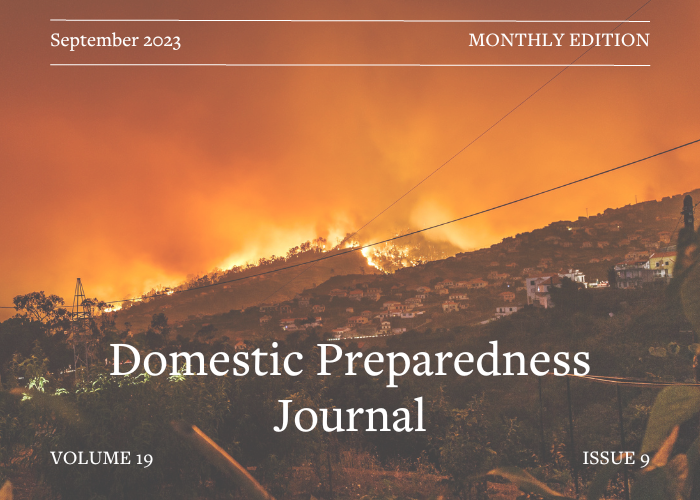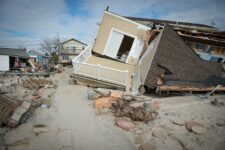

Close to Home
Catherine L. Feinman
August 30, 2023
This August 2023 issue of the Domestic Preparedness Journal focuses on several ways disasters can suddenly hit close to home and suggestions for mitigating potentially devastating consequences.

Targeted Violence in Schools: Are Future Educators Prepared?
Danielle Arias, Jesse Spearo and Kelley L. Davis
August 23, 2023
Targeted-violent events threaten staff and students’ physical, psychological, and emotional well-being in public schools. However, the increasing frequency of these incidents raises concerns about the preparedness of incoming teachers and current staff to handle such incidents.

Fireproofing the Future: Safeguarding Against Wildfires
Roy Thun
August 23, 2023
July 2023 was the world’s hottest recorded month in history. Increasing heat events increase the risk of wildfires. However, good land and waste management practices can significantly prevent and mitigate the risk and consequences of these events.

Deploying With Adult Non-Prescription Medication Kits
Richard (Kirk) Higgins
August 16, 2023
The availability of non-prescription medications may mean the difference between a successful deployment and needing to return home ahead of schedule. As such, first responders should consider non-prescription medication kits as part of their pre-deployment planning.

Training for Hazardous Tasks in Virtual Environments
Ryan Putman
August 16, 2023
Being able to recreate complex hazardous materials incidents in a classroom setting teaches life-saving lessons in a safe environment. Advances in virtual and augmented reality training systems provide instructors with new tools to train the next generation of first responders.

Community Preparedness for the Socially & Civically Isolated
George Schwartz
August 9, 2023
Even before the COVID-19 pandemic, about half of American adults reported feeling lonely. A lack of engagement can have serious health effects for socially isolated individuals and implications for the work of emergency management professionals.

Recruitment and Retention Panel Discussion
Aaron Alvarez, Nathan DiPillo, Anthony S. Mangeri, Elizabeth Saunders and Michael Valiente
August 9, 2023
On August 3, 2023, Domestic Preparedness hosted a panel of five emergency management professionals who discussed today’s recruitment and retention challenges.

Sports Celebrations – Expect the Best, Plan for the Worst
Robert Leverone
August 2, 2023
Large sports-related celebratory events necessitate a coordinated response from municipal government agencies and the community. Thorough planning, intelligence-based risk assessments, and stakeholder input are critical components of a comprehensive plan.

7 Best Practices for Implementing Housing Recovery Programs
Daina Ruback
August 2, 2023
Implementing Community Development Block Grant-Disaster Recovery housing recovery programs can be complex and challenging and, if not done correctly, can result in delays, inefficiencies, and inequitable outcomes. These seven best practices can help avoid common program pitfalls.

